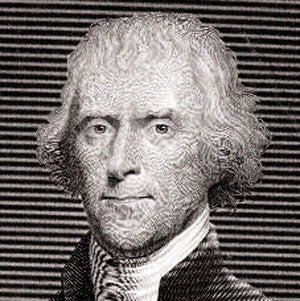Thomas Jefferson
3rd president - 1801-1809

One of the most intellectually gifted of all statesmen, Jefferson was a major force in American politics long before becoming president. He was governor of Virginia during the Revolution, was principal author of the Declaration of Independence, and served as Secretary of State under George Washington and as Vice-President (though not a supportive one) under John Adams. His sympathy for the revolutionary cause in France saw him become leader of the nascent Democratic-Republican party, in opposition to the more conservative Federalists. He opposed a strong, centralised Government and championed the rights of individual states. A fervent opponent of slavery (although this did not stop him owning slaves), he was also a champion of tolerance - who was so proud of having enacted a statute establishing religious freedom in Virginia that he asked for this, rather than his presidencies, to be mentioned on his gravestone.
Tall, thin and freckled, Jefferson was an austere president. He reduced military expenditure, reduced the national debt, and presided with conspicuous lack of pomp. Several foreign ambassadors were offended by his habit of receiving them in his pyjamas. But he was also conscientious and effective, reversing the more repressive policies of his predecessor.
A highlight of his first term was the Louisiana Purchase (1803), whereby the US paid Napoleon $11.25m for the southern part of the French North American empire, doubling the size of the nation and creating what Jefferson called an "empire for liberty".
His second term was less successful, being overshadowed by the Napoleonic wars, which had led to both both Britain and France interfering with the neutral rights of American merchantmen. Jefferson's attempted solution, an embargo upon American shipping, was not only unpopular but proved harmful to the economy.
His personal life was complicated. His wife, Martha (née Skelton), had died in 1782, and his subsequent private life provoked several scandals – which may or may not have been justified. He was once challenged to a duel, by a neighbour, John Walker, who accused him of trying to seduce his wife. Jefferson met him privately and talked him out of it. Some years later, apparently trying to impress the wife of another friend (Richard Cosway), he tried to jump a fence and badly injured his wrist. It never entirely healed. Meanwhile, modern DNA evidence suggests (but not conclusively) that Jefferson did indeed father at least one child by his slave and mistress, Sally Hemings.
But it as a thinker that he is chiefly remembered. On relinquishing the presidency, he returned to his mountain home at Monticello, Virginia, which he had built himself several decades earlier. Here he occupied himself with his correspondence, his inventions, and such projects as the American Philosophical Society (of which he was president).
Like John Adams, he died on July 4, 1826.
In his own words
"I have sworn upon the altar of God eternal hostility against every form of tyranny over the mind of man."
"The tree of liberty must be refreshed from time to time with the blood of patriots and tyrants."
In others' words
"He lives and will live in the memory and gratitude of the wise and good, as a luminary of Science, as a votary of liberty, as a model of patriotism, and as a benefactor of human kind." James Madison
"A ridiculous affectation of simplicity... may have had a momentary effect with the few ignorant and unsuspecting, but have long ago excited the derision of the many, who know that under the assumed cloak of humility lurks the most ambitious spirit, the most overweening pride..." William Loughton Smith
Minutiae
Every morning, Jefferson would soak his feet in a bath of cold water.
He was a great believer in beer. "I wish to see this beverage become common, instead of the whiskey which kills one third of our citizens."
He is the only president to have a plant named after him: Jeffersonia (also known as rheumatism root).
Despite his opposition to slavery, Jefferson was one of America's biggest slave-owners. (He had inherited them.)
Jefferson died $107,000 in debt – equivalent to many millions today.
He risked the death penalty by smuggling rice samples out of Italy; descendants of the strain are still grown in the US today.
Jefferson was a prolific inventor; his more practical inventions included the swivel chair and the dumb waiter.
Join our commenting forum
Join thought-provoking conversations, follow other Independent readers and see their replies
Comments
Bookmark popover
Removed from bookmarks